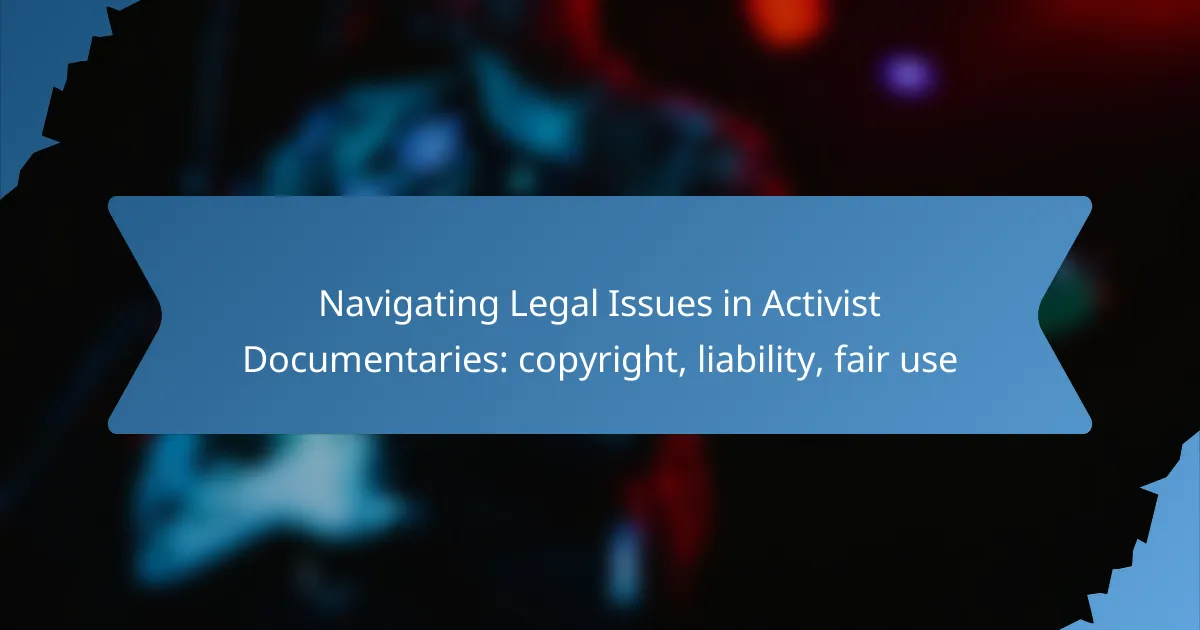Navigating the legal landscape of activist documentaries is essential for filmmakers, as they often face challenges related to copyright infringement, defamation liability, and the nuances of fair use. By understanding copyright laws and obtaining necessary licenses, filmmakers can effectively protect their work while conveying powerful messages. Adhering to best practices for copyright compliance not only mitigates legal risks but also fosters ethical content creation.
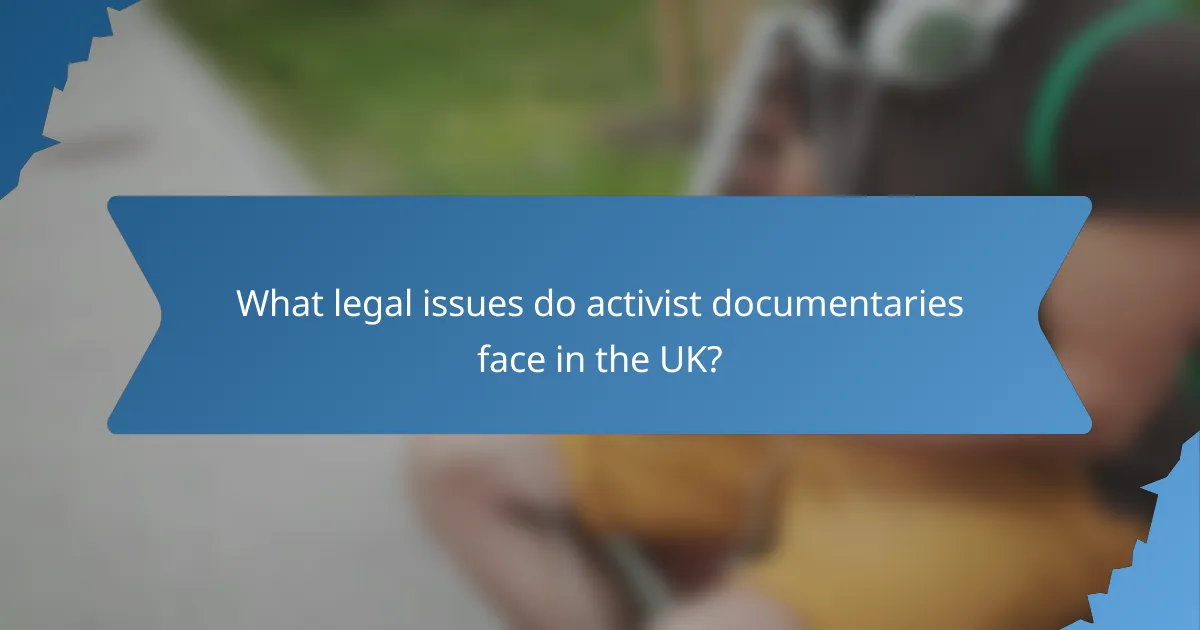
What legal issues do activist documentaries face in the UK?
Activist documentaries in the UK encounter several legal challenges, primarily related to copyright infringement, liability for defamation, and the complexities of fair use. Understanding these issues is crucial for filmmakers to protect their work and avoid legal pitfalls.
Copyright infringement risks
Copyright infringement is a significant concern for activist documentaries, as using copyrighted material without permission can lead to legal action. Filmmakers must ensure they have the rights to any music, footage, or images they include, which may involve obtaining licenses or using public domain content.
To mitigate risks, consider using original content or materials that fall under Creative Commons licenses. Always verify the specific terms of use and give appropriate credit when required.
Liability for defamation
Liability for defamation arises when a documentary makes false statements that harm an individual’s reputation. Activist filmmakers should be cautious about the language they use and the claims they make, especially regarding public figures or organizations.
To reduce defamation risks, filmmakers should fact-check their content thoroughly and consider including disclaimers. Consulting with a legal expert before releasing the documentary can also help identify potential issues.
Challenges of fair use
Fair use in the UK, often referred to as “fair dealing,” allows limited use of copyrighted material without permission under certain conditions. However, the application of fair dealing can be complex, and it typically requires a careful assessment of purpose, nature, amount used, and effect on the market.
Filmmakers should be aware that fair dealing is not a blanket protection and can vary based on context. It’s advisable to seek legal advice when planning to rely on fair dealing to avoid unintentional infringement.
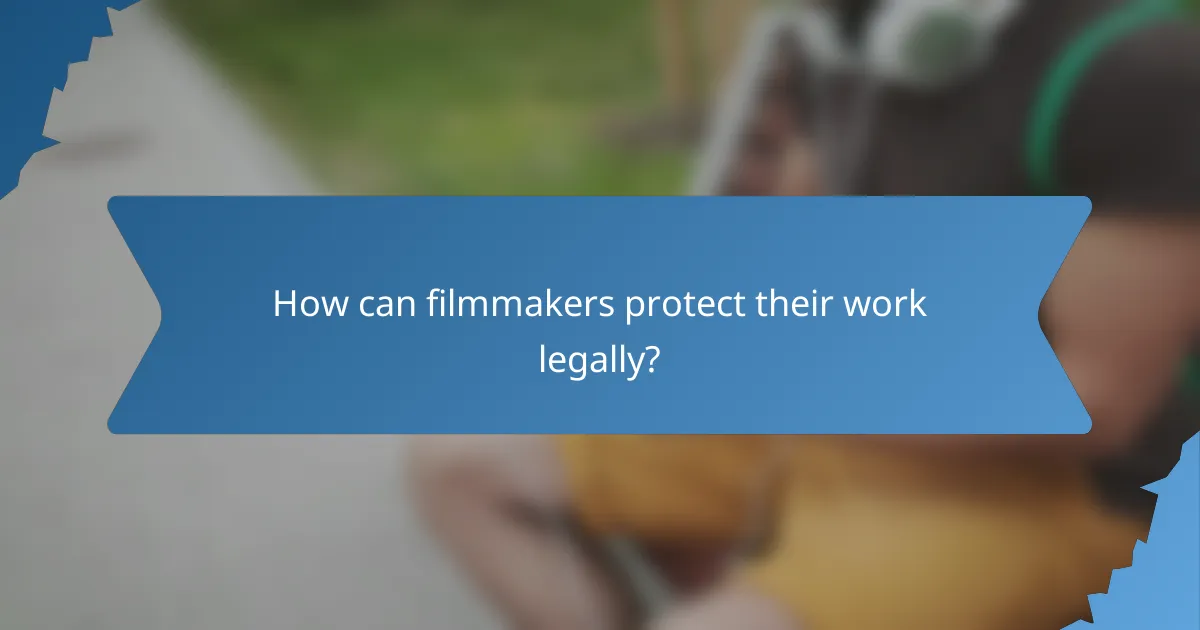
How can filmmakers protect their work legally?
Filmmakers can protect their work legally by understanding copyright laws, obtaining necessary licenses, and effectively utilizing fair use. These steps help mitigate the risk of legal issues while ensuring that the documentary’s message is conveyed without infringing on others’ rights.
Obtaining licenses for copyrighted material
To use copyrighted material, filmmakers must obtain licenses from the copyright holders. This process often involves negotiating terms and fees, which can vary significantly based on the type of content and its intended use.
Commonly licensed materials include music, film clips, and images. Filmmakers should budget for these costs, as they can range from a few hundred to several thousand dollars, depending on the material’s popularity and usage scope.
Using fair use effectively
Fair use allows filmmakers to use limited portions of copyrighted material without permission under certain conditions. This doctrine typically applies to commentary, criticism, or educational purposes, but it requires careful consideration of factors like the purpose of use and the amount of material used.
Filmmakers should aim to use only what is necessary for their message and avoid using entire works. A good rule of thumb is to limit usage to short clips or excerpts, ensuring that the new work adds value or insight rather than simply replicating the original.
Consulting legal experts
Engaging with legal experts who specialize in intellectual property law is crucial for filmmakers. These professionals can provide tailored advice on copyright issues, fair use, and liability, helping to navigate complex legal landscapes.
Filmmakers should consider consulting a lawyer during the pre-production phase to identify potential legal risks and develop strategies to mitigate them. This proactive approach can save time and resources, preventing costly legal disputes down the line.
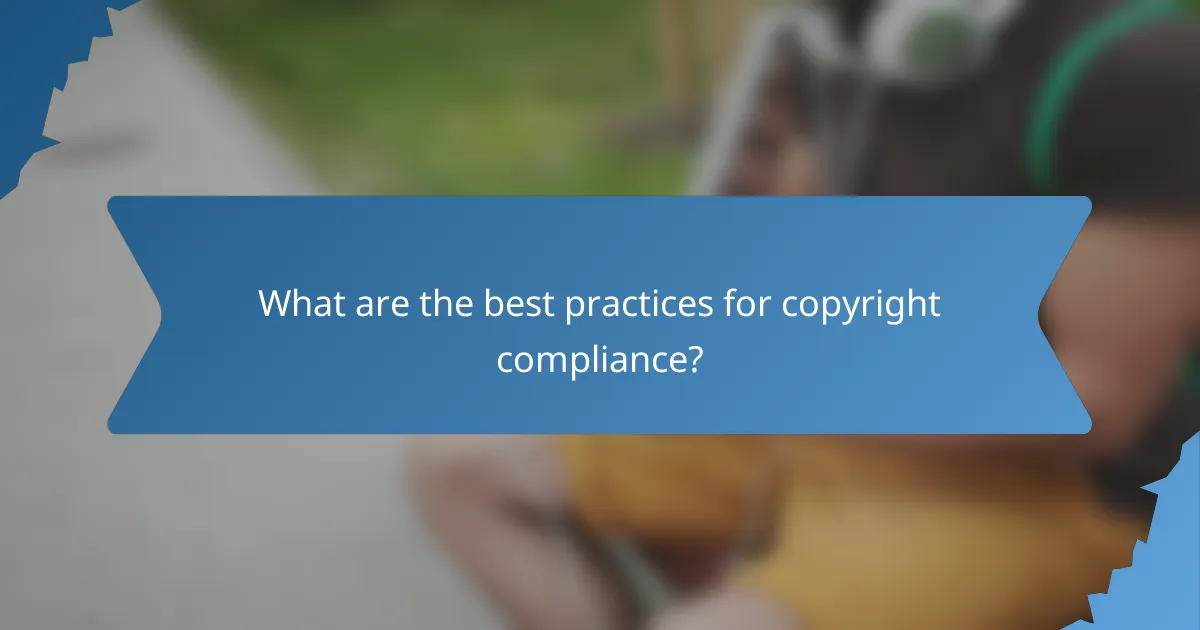
What are the best practices for copyright compliance?
Best practices for copyright compliance in activist documentaries include understanding the legal frameworks surrounding copyright, ensuring proper attribution, and obtaining necessary permissions. These steps help mitigate legal risks and promote ethical content creation.
Attribution of sources
Attributing sources correctly is essential in maintaining copyright compliance. Always credit the original creators of any material used, whether it’s video clips, images, or music. This not only respects intellectual property rights but also enhances the credibility of your documentary.
When attributing sources, include the creator’s name, the title of the work, and the source of the material. For online content, providing a hyperlink to the original source is often effective. This practice fosters transparency and accountability.
Documenting permissions
Documenting permissions is crucial when using copyrighted material. Always obtain written consent from copyright holders before including their work in your documentary. This documentation serves as legal protection in case of disputes.
Keep a detailed record of all permissions granted, including the date, the specific material authorized for use, and any conditions attached to the permission. This organized approach can save time and prevent misunderstandings later on.
Creating original content
Creating original content is one of the safest ways to avoid copyright issues. By producing your own footage, music, and graphics, you retain full ownership and control over your work. This approach also allows for greater creative expression tailored to your documentary’s message.
Consider incorporating interviews, personal narratives, and unique visuals that reflect your perspective. Additionally, using royalty-free or Creative Commons-licensed material can supplement your original content while ensuring compliance with copyright laws.
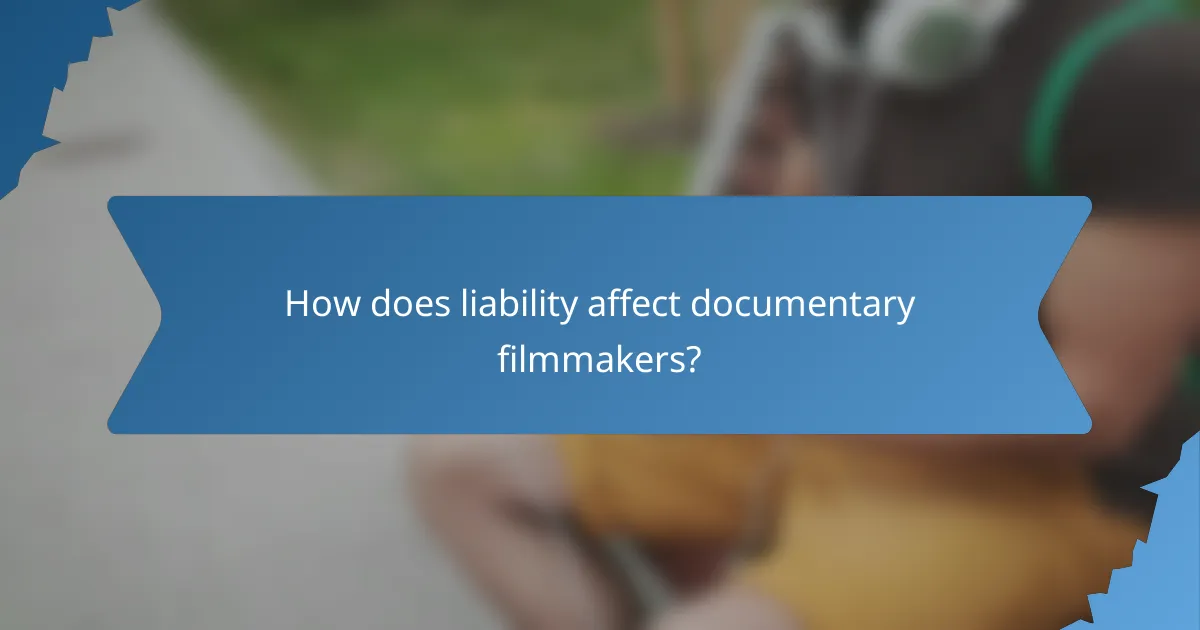
How does liability affect documentary filmmakers?
Liability significantly impacts documentary filmmakers by exposing them to potential legal claims related to their content. This includes risks associated with defamation, copyright infringement, and other legal issues that may arise from the portrayal of individuals or events.
Understanding defamation laws
Defamation laws protect individuals from false statements that could harm their reputation. Filmmakers must be cautious when depicting real people or events, as even truthful portrayals can lead to claims if they are deemed damaging or misleading.
To avoid defamation, filmmakers should ensure that their content is factually accurate and consider obtaining consent from individuals featured in the documentary. Consulting with legal experts can help clarify what constitutes defamation in specific jurisdictions.
Insurance options for filmmakers
Filmmakers can mitigate liability risks by obtaining various types of insurance, including general liability, errors and omissions (E&O), and media liability insurance. E&O insurance is particularly important as it covers claims related to copyright infringement and defamation.
Costs for insurance can vary widely based on the project’s scope and budget, typically ranging from a few hundred to several thousand dollars. Filmmakers should compare policies to find coverage that best suits their needs and budget.
Mitigating risks through disclaimers
Disclaimers can serve as a protective measure for filmmakers by clarifying the intent and context of the documentary. Including a disclaimer that states the opinions expressed are those of the individuals featured can help reduce liability for defamation claims.
While disclaimers do not guarantee immunity from legal action, they can demonstrate a filmmaker’s intent to present information responsibly. It’s advisable to work with legal counsel to craft effective disclaimers tailored to the documentary’s content and context.
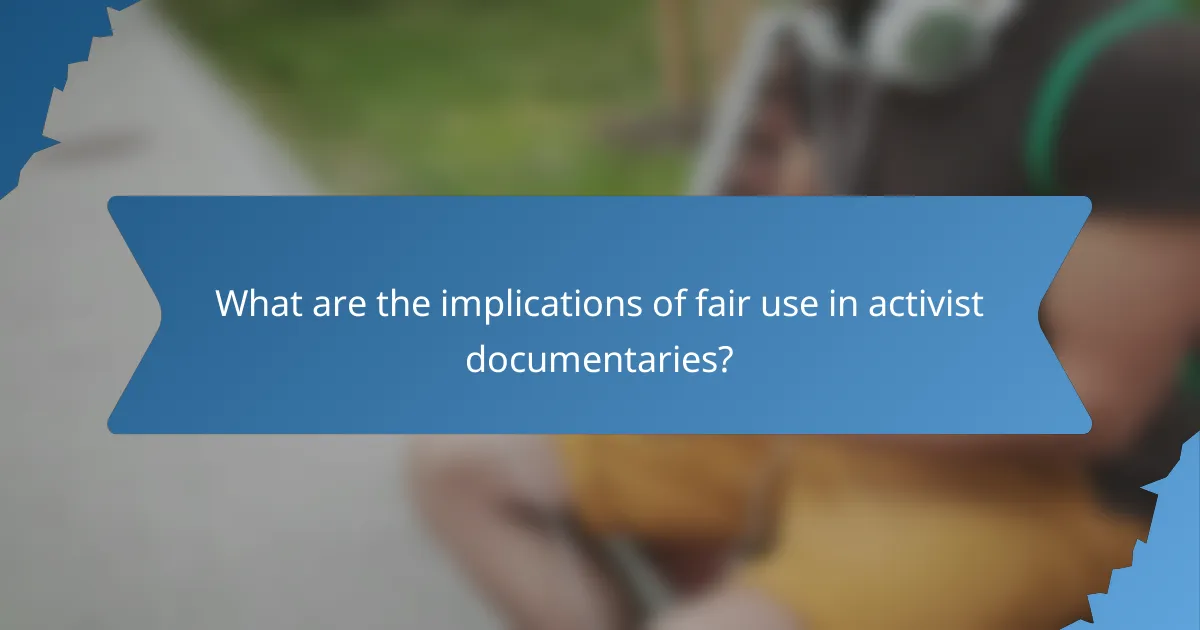
What are the implications of fair use in activist documentaries?
Fair use allows activist documentaries to incorporate copyrighted material without permission under certain conditions. This legal doctrine is crucial for filmmakers aiming to comment on, criticize, or educate about social issues while navigating copyright laws.
Defining fair use in the UK
In the UK, fair use is not explicitly defined as it is in the US; instead, the concept is referred to as “fair dealing.” Fair dealing permits the use of copyrighted material for specific purposes such as criticism, review, or news reporting, provided the use is fair and does not negatively impact the market for the original work.
Key factors influencing fair dealing include the purpose of use, the amount of material used, and the effect on the market value of the original work. Activist filmmakers should assess these factors carefully to ensure compliance with UK copyright law.
Case studies of fair use applications
Several activist documentaries have successfully utilized fair use principles. For instance, in the documentary “The Act of Killing,” filmmakers used archival footage to critique historical events, which was deemed fair dealing due to its transformative nature and educational intent.
Another example is “Citizenfour,” which incorporated leaked documents and recordings to expose government surveillance. The documentary’s focus on public interest and social commentary supported its fair use claim, demonstrating how activist filmmakers can navigate copyright issues effectively.
Limitations and challenges
Despite the protections offered by fair use, activist documentaries face limitations and challenges. The subjective nature of what constitutes “fair” can lead to legal disputes, and filmmakers may find themselves in court if rights holders challenge their use of material.
Additionally, the risk of misinterpretation of fair use guidelines can result in self-censorship, where filmmakers avoid using potentially impactful content out of fear of legal repercussions. It is advisable for filmmakers to seek legal counsel when in doubt about their use of copyrighted material.
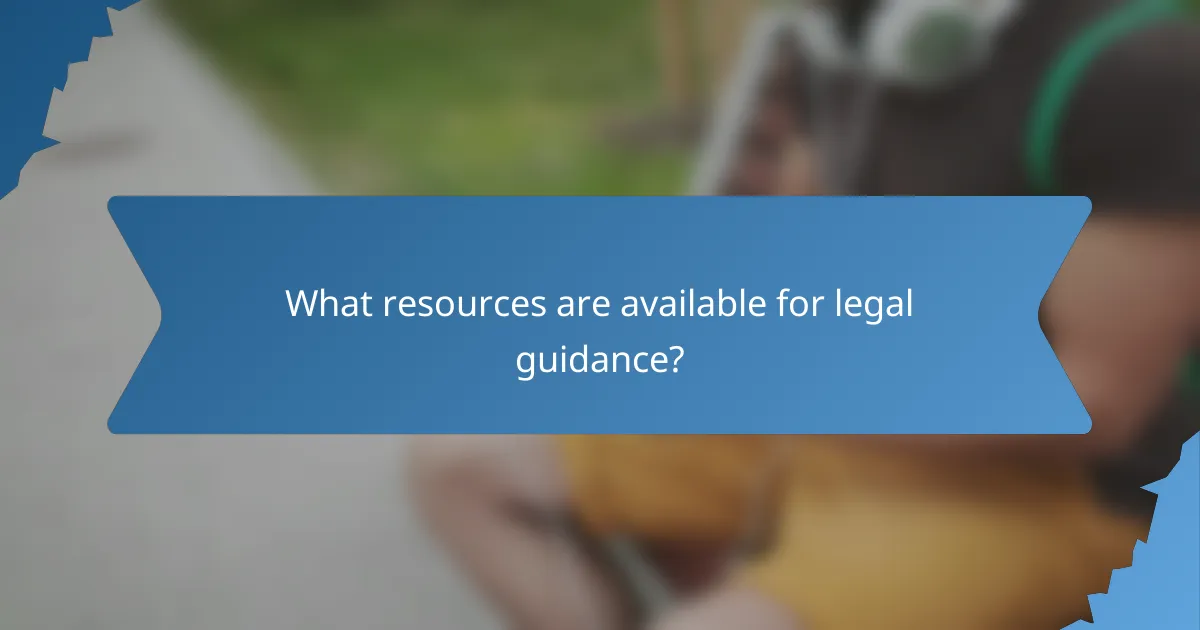
What resources are available for legal guidance?
Activist filmmakers can access various resources for legal guidance, including organizations, online platforms, and legal professionals specializing in media law. These resources help navigate copyright, liability, and fair use issues that may arise during documentary production.
Legal Clinics and Nonprofits
Legal clinics and nonprofit organizations often provide free or low-cost legal assistance to filmmakers. Groups like the Volunteer Lawyers for the Arts (VLA) in the U.S. offer consultations and workshops focused on copyright and fair use, which can be invaluable for independent creators.
Consider reaching out to local arts organizations or university law schools, as they frequently have programs designed to support filmmakers and artists. These resources can help clarify legal rights and responsibilities in documentary filmmaking.
Online Legal Resources
Numerous online platforms offer legal information tailored to filmmakers. Websites like the Electronic Frontier Foundation (EFF) and the Center for Media and Social Impact provide articles, guides, and toolkits on copyright and fair use that are easily accessible and user-friendly.
Utilizing these online resources can help you understand the legal landscape without incurring high costs. They often include case studies and examples that illustrate how to apply legal principles in real-world scenarios.
Consulting Legal Professionals
Consulting with a legal professional who specializes in media law is a crucial step for filmmakers facing complex legal issues. Hiring an attorney can provide tailored advice on copyright, liability, and fair use, helping to mitigate risks associated with documentary production.
When selecting a lawyer, look for someone with experience in the film industry and a solid understanding of the specific legal challenges faced by activists. This investment can save time and resources in the long run by ensuring compliance with relevant laws and regulations.
